Kay Ivey awards $1.6 million to law enforcement agencies

Gov. Kay Ivey has awarded $1.6 million to aid in the fight against illegal drugs and drug-related crime in Alabama. The Alabama Law Enforcement Agency (ALEA) and the state’s seven regional drug task forces will each receive $202,557. The funds will be used to continue the battle against drug sellers, manufacturers, and users and to stop the sale and illegal use of pharmaceutical drugs. “Public safety is at the forefront of our mission, and I am proud to aid our law enforcement in the battle against illegal drugs and crime,” stated Ivey. “As I said last night during my state of the state address, we will continue working to make Alabama a great state to live, work and raise a family for years to come. No doubt, that includes keeping our communities safe and free of crime. I commend the important work being done by ALEA and these task forces.” These task forces were formed in 2018 and are made up of members from law enforcement agencies within their region. Each region comprises eight to 12 counties. The Alabama Department of Economic and Community Affairs is administering the grants from funds from the U.S. Department of Justice and will be used to cover overtime, and operational and equipment expenses. ADECA administers an array of programs supporting law enforcement and traffic safety, economic development, energy conservation, water resource management, and recreation development. “ADECA is pleased to play a role in this program that helps take drugs off the streets and make our communities safer,” ADECA Director Kenneth Boswell stated. “We join Gov. Ivey in commending the work of these task forces.”
Kay Ivey announces $300K in grants for law enforcement training and former inmate job opportunities
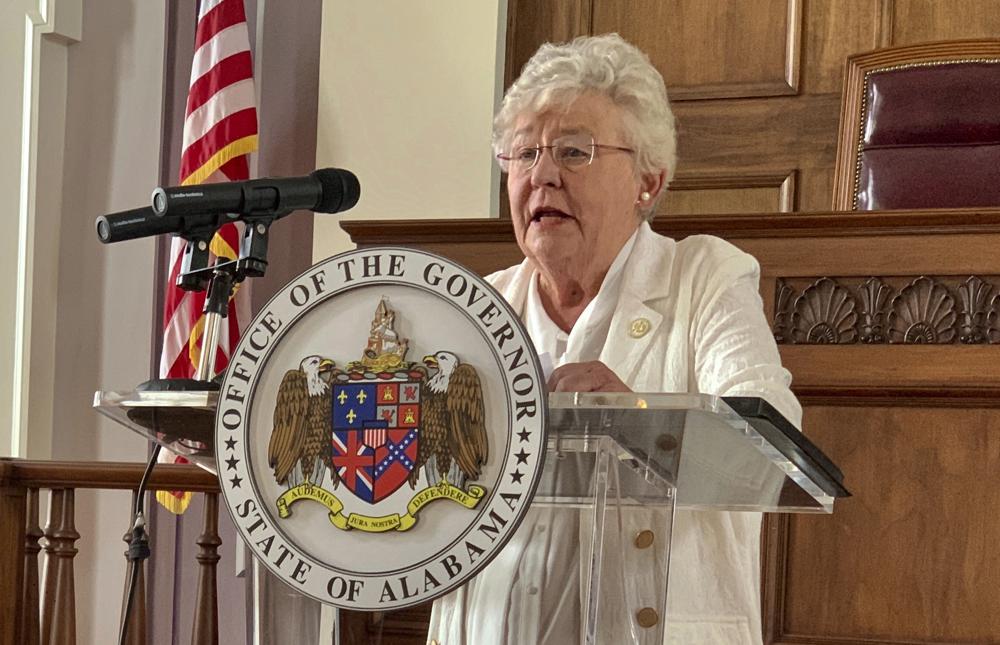
The Alabama Department of Economic and Community Affairs (ADECA) announced that Gov. Kay Ivey has awarded grants totaling $300,000 for law enforcement agents. Two grants totaling $200,000 will help law enforcement agents improve their skills in reducing crime and capturing criminals while another grant for $100,000 will be used to provide jobs to former inmates to reduce their chances of returning to prison after their release. ADECA will administer the grants from funds made available by the U.S. Department of Justice. ADECA offers programs supporting law enforcement and traffic safety, economic development, energy conservation, water resource management, and recreation development. Ivey stated, “Education means more opportunities, and that is true with both the training of our law enforcement, as well as and with current inmates to make sure they can be productive citizens. I am pleased to award these grants for all three of these programs.” “ADECA is pleased to join with Gov. Ivey in these three programs to continue training law enforcement officers and to teach job skills to inmates who can become law-abiding, tax-paying citizens when released from prison,” ADECA Director Kenneth Boswell said. Auburn University Montgomery received a $100,000 grant to conduct a statewide crime prevention training program for local, county, and state law enforcement officers and related workers. Jacksonville State University, also the recipient of a $100,000 grant, will continue to train law enforcement officers, particularly on the local level, in the basics of forensic sciences and evidence gathering. J.F. Ingram State Technical College in Elmore County will use funds to continue a program that links Ingram graduates who are inmates at nearby prisons with employers throughout Alabama needing their skills upon release.
25 grants totaling $9.5 million awarded to help crime victims
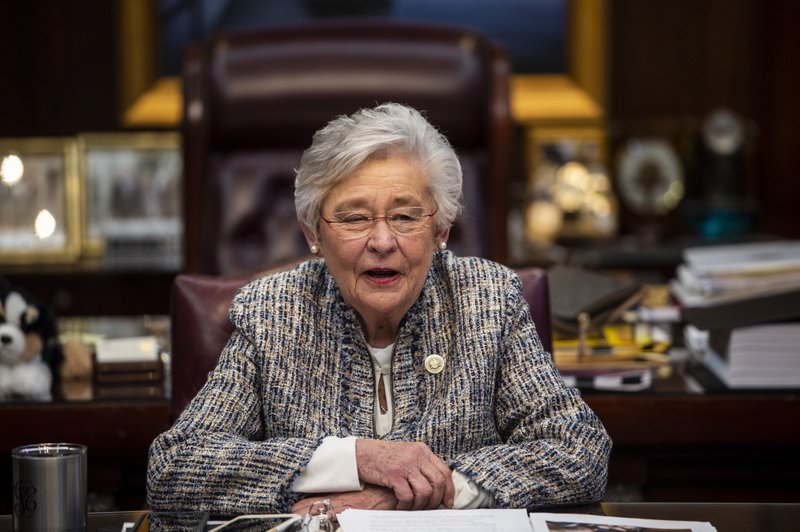
Gov. Kay Ivey has awarded 25 grants totaling more than $9.5 million to help victims of crime across Alabama. These organizations offer services that support victims of domestic violence, sexual assault, child abuse, elder abuse, and other crimes. Services can include counseling, safe shelter, court advocacy, legal services, and more. Governor Ivey stated, “I am very thankful for these organizations across our state that provide help to residents of their communities in times of need. These organizations work to ensure that assistance is available for victims of crime 24 hours a day, seven days a week.” The Alabama Department of Economic and Community Affairs (ADECA) will administer the grants from funds made available by the U.S. Department of Justice. ADECA administers a wide range of programs that support law enforcement, victim services, economic development, water resource management, energy conservation, broadband expansion, and recreation. “ADECA stands with Gov. Ivey in support of these organizations and the important work they do across Alabama,” ADECA Director Kenneth Boswell stated. “These funds will help each organization continue their services to the people of Alabama.” .@GovernorKayIvey awards more than $9.5 million to assist victims of crime in Alabama https://t.co/C9lFide3dJ — ADECA (@ADECA) December 16, 2021 The following grants were awarded: $89,000 to the Family Services Center Inc. which serves Colbert, Cullman, Franklin, Jackson, Lauderdale, Lawrence, Limestone, Madison, Marion, Marshall, Morgan and Winston counties. $49,500 to Legal Services Alabama Inc. This grant provides assistance for Madison County, but the organization serves statewide. $77,583 to Thrive Alabama (AIDS Action Coalition of Huntsville Inc.) which serves Colbert, Cullman, Franklin, Jackson, Lauderdale, Lawrence, Limestone, Madison, Marion, Marshall, Morgan and Winston counties. $523,000 to AshaKiran Inc. This grant provides assistance for Jackson, Limestone, Madison and Montgomery counties, but the organization offers some services statewide. $313,166 to Victim Services of Cullman, Inc. which serves Cullman County. $107,651 to 2nd Chance Inc. which serves Calhoun, Cleburne, Etowah and Talladega counties. $47,000 to Family Services Center of Calhoun County Inc. which serves Calhoun County. $178,640 to Family Resource Center of Northwest Alabama Inc. which serves Walker County. $47,250 to Humane Society of Shelby County Inc. which serves Blount, Clay, Coosa, Jefferson, St. Clair, Shelby and Walker counties. $719,840 to YWCA Central Alabama which serves Blount, Jefferson and St. Clair counties. $150,720 to Bessemer Cut Off Advocacy Center Inc. which serves Jefferson County. $335,000 to Hispanic Interest Coalition of Alabama which serves Blount, Chilton, Jefferson and Shelby counties. $231,440 to Turning Point (SAN Inc.) which serves Bibb, Fayette, Hale, Lamar, Pickens and Tuscaloosa counties. $207,680 to the Domestic Violence Intervention Center which serves Chambers, Lee, Macon, Randolph, Russell and Tallapoosa counties. $148,800 to Tri-County Children’s Advocacy Center which serves Chambers, Randolph and Tallapoosa counties. $80,080 to Hope Harbour (Columbus Alliance for Battered Women Inc.) which serves Russell County. $424,170 to One Place Family Justice Center which serves domestic violence victims in Autauga, Butler, Chilton, Crenshaw, Elmore, Lowndes and Montgomery counties. $266,000 to One Place Family Justice Center which serves sexual assault victims in Autauga, Butler, Crenshaw, Dallas, Elmore, Lowndes, Montgomery, Perry and Wilcox counties. $989,114 to the Family Sunshine Center (Montgomery Area Family Violence Program Inc.) which serves domestic violence victims in Autauga, Butler, Chilton, Crenshaw, Elmore, Lowndes and Montgomery counties. $266,343 to the Family Sunshine Center (Montgomery Area Family Violence Program Inc.) which serves sexual assault victims in Autauga, Butler, Chilton, Crenshaw, Elmore, Lowndes and Montgomery counties. $361,613 to the Family Sunshine Center (Montgomery Area Family Violence Program Inc.) for services they provide statewide. $280,424 to The Lighthouse (Baldwin Family Violence Shelter) which serves Baldwin, Conecuh, Escambia and Monroe counties. $90,000 to Mothers Against Drunk Driving which serves the families of victims injured or killed by drunken drivers statewide. $1.6 million to Alabama CASA Network Inc. which provides court-appointed advocates for abuse victims statewide. $1.9 million to the Alabama Department of Human Resources which serves victims of elder abuse statewide.
Kay Ivey awards two grants to ALEA to update sex offender tracking system

Gov. Kay Ivey has awarded two grants, totaling $143,192, to enhance public safety in Alabama. The Alabama Law Enforcement Agency received the grants that will help keep track of sex offenders and ensure that the state is up to date on a new federal crime reporting method. The Alabama Sex Offender Registration and Community Notification Act assists law enforcement agencies in keeping track of sex offenders. The National Incident-Based Reporting Summary (NIBRS) is a new national crime reporting system that is more comprehensive and all-encompassing than the current system it is replacing. According to the FBI website, the NIBRS was implemented to improve the overall quality of crime data collected by law enforcement. The system captures details on each single crime incident—as well as on separate offenses within the same incident—including information on victims, known offenders, relationships between victims and offenders, arrestees, and property involved in crimes. “ALEA and our local law enforcement agencies throughout Alabama do a superb, yet often unappreciated job of maintaining law and order in our state,” Gov. Ivey stated. “This funding will help provide the needed financial resources to maintain and update registries as required by federal and state laws.” The Alabama Department of Economic and Community Affairs (ADECA) is administering the grants from funds made available by the U.S. Department of Justice. “ADECA is pleased to partner with Gov. Ivey and the Alabama Law Enforcement Agency in these measures to improve public safety,” ADECA Director Kenneth Boswell stated. ADECA administers an array of programs supporting law enforcement and traffic safety, economic development, energy conservation, water resource management, and recreation development.
Kay Ivey awards $4.8 million grant to help child victims of abuse

Gov. Kay Ivey has awarded grants totaling $4.8 million to help provide services to child victims of abuse, neglect, and sexual assault. The grants will provide training and resources to local law enforcement and nonprofit agencies and help many nonprofit organizations provide services including forensic interviews, mental health services, medical services referrals, advocacy, community education, and prevention services. “Young victims deserve to have the same professional services and help given to them as adult victims,” Gov. Ivey said. “I commend these agencies that work daily to help those who have been harmed and work to prevent further abuse.” The Alabama Department of Economic and Community Affairs (ADECA) will administer the grants from funds made available by the U.S. Department of Justice. ADECA administers a wide range of programs that support law enforcement, economic development, infrastructure upgrades, recreation, energy conservation, and water resources management. “ADECA shares Gov. Ivey’s dedication to protecting the most vulnerable among us by making sure child victims have the resources they need and that those helping the children are trained to provide the best assistance possible,” ADECA Director Kenneth Boswell stated. The following grants were awarded to various local and state agencies that provide direct services to victims and providers: Russell County Child Advocacy Center (Russell County): $66,240. Pike Regional Child Advocacy Center (Barbour, Bullock, Coffee, Pike): $109,440. Morgan County Child Advocacy Center (Morgan County): $229,440. The Children’s Advocacy Center of Cherokee County (Cherokee County): $140,160. Walker County Children’s Advocacy Center (Walker, Marion): $217,920. Escambia County Regional Child Advocacy Center, Inc. (Conecuh, Escambia, Monroe): $67,200. Family Counseling Center of Mobile, Inc. (Mobile County): $347,650. West Alabama Children’s Advocacy Center (Fayette, Lamar, Pickens): $83,520. Covington County Child Advocacy Center, Inc. (Covington County): $91,200. The Child Advocacy Center of Marshall County (Marshall County): $144,000. Talladega County Child Advocacy Center, Inc. (Clay, Coosa, Talladega): $82,560. DeKalb County Children’s Advocacy Center, Inc. (DeKalb County): $270,487. Cramer Children’s Center (Colbert, Franklin, Lauderdale, Lawrence, Winston): $583,680. James M. Barrie Center for Children, Inc. (Etowah County): $260,160. St. Clair Children’s Advocacy Center (St. Clair County): $65,280. Butterfly Bridge Children’s Advocacy Center, Inc. (Autauga, Chilton, Elmore): $270,720. CARE House, Inc. (Baldwin County): $116,160. Prescott House Child Advocacy Center (Jefferson County): $242,880. Calhoun/Cleburne Children’s Center, Inc. (Calhoun, Cleburne): $130,560. National Children’s Advocacy Center (DeKalb, Jackson, Madison, Marshall, Morgan): $597,983. Central Alabama Regional Child Advocacy Center (Bibb, Dallas, Hale, Perry, Wilcox): $105,600. Child Protect Inc. (Montgomery County): $131,520. The Child Advocacy Center of Cullman, Inc. (Cullman County): $234,477. Shelby County Children’s Advocacy Center, Inc. (Shelby County): $281,280.
Governor Kay Ivey touts $7 million in National Highway Traffic Safety Administration grants

Governor Kay Ivey announced nearly $7 million in grants, in order to make Alabama roads safer. The state’s four regional traffic safety offices and the Alabama Law Enforcement Agency will use the funds to cover overtime for local police officers, sheriff’s deputies, and state troopers conducting extra patrols. It will also help provide more checkpoints during peak travel times, like major holidays, targeting speeding, seat belt violations, and impaired driving. Funding will cover major enforcement details like “Click It or Ticket” and “Drive Sober or Get Pulled Over.” According to Drive Safe Alabama, in 2019, there were 930 people killed in 851 fatal crashes. In Alabama, a traffic crash is reported every 3 minutes and 18 seconds. Ivey stated in a press release, “In Alabama, we are funding our law enforcement community to ensure their efforts to protect our communities are supported. These grants will go a long way in reinforcing highway safety across our state. As we head into another peak travel time, that will be even more important. Ensuring public safety is one of the primary responsibilities of government and is a top priority for the Ivey Administration.” ADECA Director Kenneth Boswell applauded the funding and efforts to make Alabama roads safer. “ADECA stands with Governor Ivey, the four highway safety offices, and local law enforcement agencies who are helping make Alabama’s roads safer for everyone traveling in our state,” Boswell stated. Governor Ivey awarded the following grants: $1.39 million to the Franklin County Commission for the North Central Alabama Highway Safety Office. The office serves Colbert, Cullman, DeKalb, Fayette, Franklin, Lamar, Lauderdale, Lawrence, Limestone, Jackson, Madison, Marshall, Marion, Morgan, Pickens, Walker and Winston counties. $1.66 million to the city of Opelika for the East Central Alabama Highway Safety Office which serves Blount, Calhoun, Chambers, Cherokee, Chilton, Clay, Cleburne, Coosa, Elmore, Etowah, Jefferson, Lee, Macon, Randolph, St. Clair, Shelby, Talladega and Tallapoosa counties. $1.21 million for the Southeast Alabama Regional Highway Safety Office at Enterprise State Community College. The office serves Autauga, Barbour, Bibb, Bullock, Butler, Coffee, Covington, Crenshaw, Dale, Geneva, Henry, Houston, Lowndes, Montgomery, Pike, Russell and Tuscaloosa counties. $957,369 to the Mobile County Commission for the Southwest Regional Highway Safety Office which serves Baldwin, Choctaw, Clarke, Conecuh, Dallas, Escambia, Greene, Hale, Marengo, Mobile, Monroe, Perry, Sumter, Washington and Wilcox counties. $1.54 million to ALEA cover overtime for state troopers who are working extra shifts during periods and in locations that have high numbers of speeding and impaired driving violations. $183,106 to the Office of Prosecution Services to provide local prosecutors and local law enforcement with a veteran statewide prosecutor that will provide training, education, legal research and technical assistance on traffic safety related issues.
Alabama starting new push to promote electric vehicles
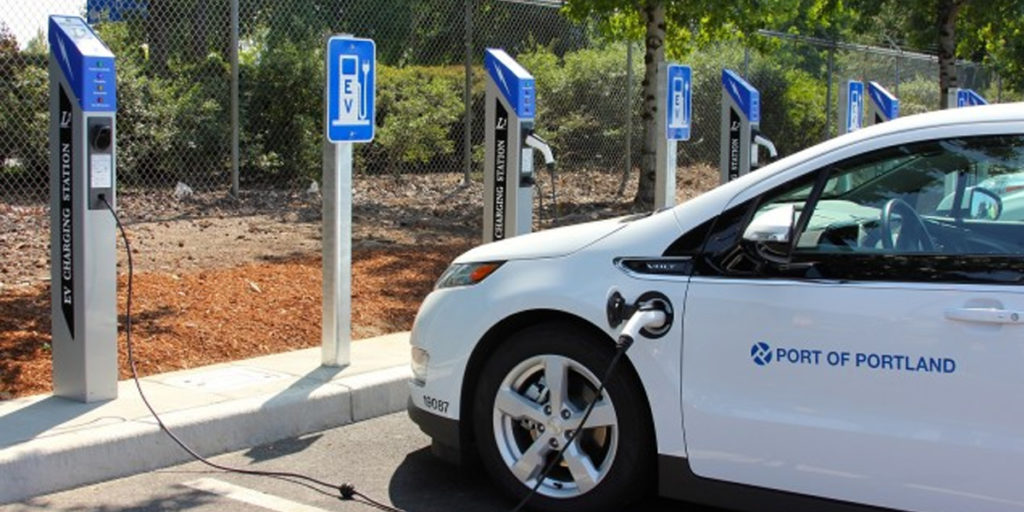
The state announced a campaign Monday to promote electric vehicles that includes adding more charging stations that are available to motorists across Alabama. Coordinated by the Alabama Department of Economic and Community Affairs, the Drive Electric Alabama Project is intended to both raise awareness of the benefits of electric vehicles and expand the state’s infrastructure for them, officials said. “It’s clear electric vehicles represent the next generation of automobile manufacturing,” ADECA Director Kenneth Boswell said in a statement. “That’s precisely why this is the perfect time for Alabamians to learn about electric vehicles, as many auto manufacturers, including Mercedes-Benz right here in our state, are beginning to add electric vehicles to their fleets.” Gov. Kay Ivey attended an unveiling of the campaign in Birmingham but indicated she plans to continue using her conventional vehicle, at least for now, al.com reported. “My Mercedes is still in good shape,” she said in response to a reporter’s question, al.com reported. Republished with the permission of the Associated Press.
Kay Ivey awards $480,000 to assist low-income residents

Alabama Department of Economic and Community Affairs (ADECA) announced today that Gov. Kay Ivey has awarded funds totaling $480,000 to assist community action agencies in Alabama with programs aimed at helping lift people out of poverty. The Community Action Agencies Association of Alabama is using $450,000 to provide support to 19 Community Action Agencies across Alabama. These programs offer assistance to low-income residents to help with things like GED testing fees, food assistance, and rental or utility assistance. $30,000 will go to the Community Action Partnership of North Alabama to support a program that provides food to low-income senior citizens and disabled individuals in Marion and Winston counties. Ivey stated, “By assisting those most in need, community action agencies can provide a path to a better life for many families and individuals. As we celebrate Thanksgiving this week, we are also reminded how important it is to help those in need. I am pleased to provide these funds to these agencies who work every day to give those who need a helping hand to improve their lives and lift themselves out of poverty.” The Alabama Department of Economic and Community Affairs administers the grants from funds allocated by the Legislature in the Alabama General Fund budget. ADECA manages programs that support law enforcement, workforce development, energy conservation, water resource management, economic development, and recreation. “ADECA is proud to support Gov. Ivey’s efforts to improve the lives of some of our most vulnerable residents,” ADECA Director Kenneth Boswell said. “Our partnerships with these agencies across the state continue to make an impact.”
Governor awards $4.8 million in grants for innovation and research in Alabama
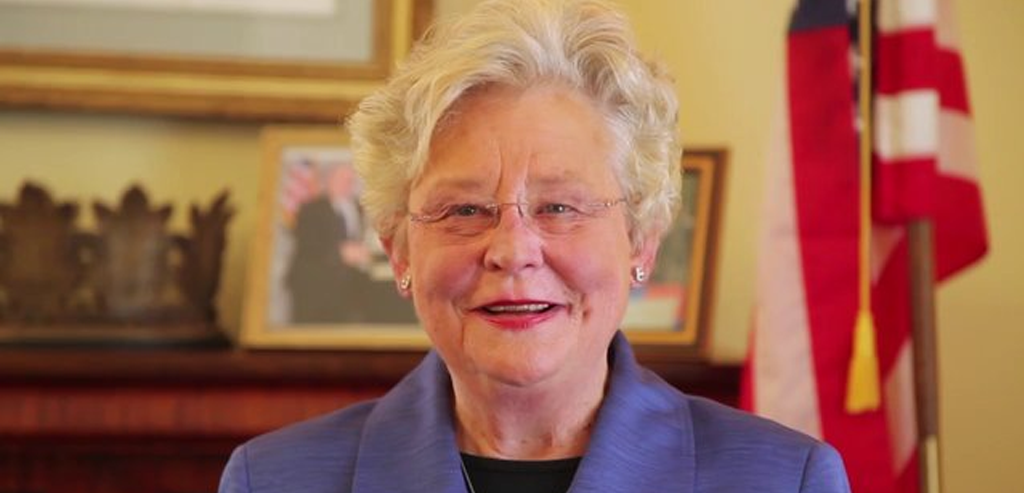
The Alabama Department of Economic and Community Affairs (ADECA) announced that Gov. Kay Ivey has awarded $4.85 million in funding to continue innovative research for ways to improve the lives of Alabamans. The grants were awarded to five Alabama universities and a research institution. The funding comes from the Alabama Research and Development Enhancement Fund, a state-funded program created in 2019 under the Alabama Innovation Act. Gov. Ivey commended the investment, hoping the innovations would improve the state of Alabama. “Our universities and research institutions in Alabama truly impact the world, and I am proud to continue investing in the important work they are doing,” Gov. Ivey said. “This $4.85 million is an investment in the future of Alabama and the future of research.” ADECA administers the grants and funds a wide range of programs that support law enforcement, victim programs, economic development, water resource management, energy conservation, and recreation. ADECA Director Kenneth Boswell applauded the funding and Ivey’s commitment to funding. “ADECA joins with Gov. Ivey in encouraging research and innovation in Alabama’s universities and research centers,” Boswell stated. “Often, what comes out of the research labs and fields has far-reaching and life-changing effects. We look forward to seeing the fruits of these research projects in the future.” The awarded grants are: The University of Alabama in Huntsville $603,206 – To train students on advanced manufacturing processes. HudsonAlpha Institute for Biotechnology (Huntsville) $968,365 – To develop better agriculture seed varieties to produce healthier and more productive crops. HudsonAlpha is collaborating with Alabama A&M University and Auburn University on the project. University of North Alabama $10,353- To research the development of an ultra-sensitive biosensor with the outcome resulting in improvements in the food and health-care industries. The University of Alabama at Birmingham $700,000 – To develop a process to improve the effectiveness of a procedure used to help amputees. $635,927 – To develop more effective pneumococcal vaccines. Auburn University $727,677 – To research producing jet and diesel fuels from woody biomass and waste plastics. $294,008 – To research and access the economic feasibility of converting organic wastes into bioplastics. $268,353 – To conduct research involving polymer smart machines. $300,432- To develop soybean hulls as a means to keep aquaculture feed pellets in mass resulting in less waste and more intake by farm-raised fish and shellfish. The University of Alabama $341,679 – To conduct research to improve building and transportation infrastructure.
Kay Ivey awards nearly $2.8 million to state’s homeless programs
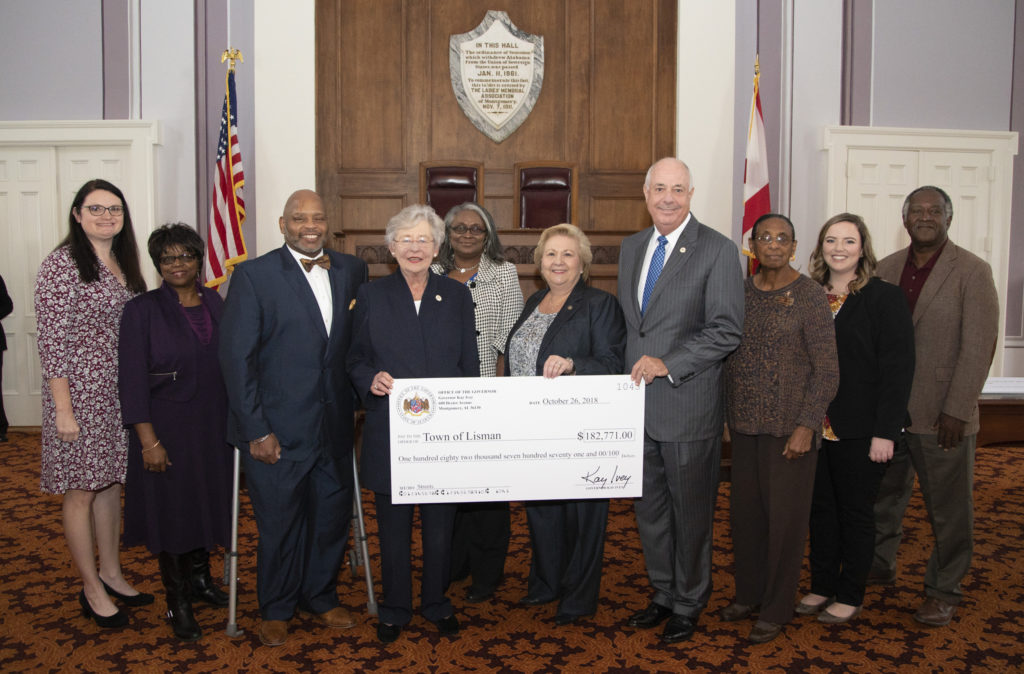
Gov. Kay Ivey awarded nearly $2.8 million to help Alabamians who are homeless or at-risk of becoming homeless to obtain shelter and other related services. The Alabama Department of Economic and Community Affairs (ADECA) will administer the grants from funds made available by the U.S. Department of Health and Human Services. The funds from the federal Emergency Solutions Grants program will enable 13 regional agencies to provide shelter, legal and health services, and other assistance to help individuals and families who face losing their homes or are already homeless. According to their website, the program’s focus is to assist people to quickly regain stability in permanent housing after experiencing a housing crisis and/or homelessness. “Alabama is a state where neighbors help neighbors, and we want to ensure we provide support for those who may be struggling the most,” said Governor Ivey. “These funds are intended to serve as a safety net to ensure that residents are provided a roof over their heads as they work to get back on their feet economically.” ADECA administers an array of programs supporting law enforcement and traffic safety, economic development, energy conservation, water resource management, and recreation development. According to the ADECA website, their programs help address critical infrastructure needs like water, sewer, and broadband; provide law enforcement equipment and support for victims of crime; build new trails and recreational features, and assist with energy efficiency that lowers energy costs “Emergency Solutions Grants, in addition to helping people obtain housing, involve measures to assist them with regaining their financial footing and becoming self-sufficient,” ADECA Director Kenneth Boswell stated. “ADECA joins with Gov. Ivey and these local agencies to provide this assistance to families at a time they need it the most.” Listed below are the awarded agencies, the amount, area served, and sub-recipient agencies. City of Huntsville – $500,000 (city of Huntsville) The city will contract with AshaKiran Inc., Community Action Partnership of Huntsville/Madison and Limestone Counties Inc., Crisis Services Center Inc., Family Services Center Inc., First Stop Inc., and RiahRose Home for Children to provide emergency services and homeless prevention. City of Florence – $300,000 (Colbert, Franklin, Lauderdale, Lawrence, Marion, and Winston counties) The city will contract with the Salvation Army of the Shoals and Safeplace Inc. to find housing for the homeless and assist people at risk of losing their homes. Marshall County Home Place Inc. – $33,000 (Marshall County) The agency will provide transitional housing for the homeless. 2nd Chance Inc. – $341,169 (Calhoun, Cherokee, Cleburne, Etowah Randolph, and Talladega counties) The agency provides emergency shelter and rapid re-housing for victims of domestic violence. Pathways Inc. – $26,000 (Jefferson County) Pathways will provide emergency shelter to homeless women and their children. Shelby County Commission – $153,700 (Shelby County) The county will contract with Family Connection Inc., Safehouse of Shelby County Inc., and Shelby Emergency Assistance to provide housing and emergency assistance. City of Tuscaloosa – $225,000 (city of Tuscaloosa) The city will contract with the Salvation Army, SAN Inc. (Turning Point), and Temporary Emergency Services to provide outreach, emergency shelter, and homeless prevention. Dallas County Family Resource Center – $100,000 (Dallas County) The center will provide emergency shelter and homeless prevention assistance and rapid re-housing to homeless persons or those at risk of losing their homes. Montgomery Area Coalition for the Homeless Inc. – $500,000 (Autauga, Bullock, Elmore, Lowndes, and Montgomery counties) The coalition will provide street outreach, emergency shelter, rapid re-housing, and homeless prevention. It contracts with the Family Sunshine Center, Friendship Mission Inc., and the Salvation Army for some of the services. Family Promise of Baldwin County – $99,000 (Baldwin County) Family Promise will provide emergency shelter, homelessness prevention, and rapid re-housing assistance. Salvation Army’s Family Haven Program – $200,000 (Mobile and Baldwin counties) The program provides emergency shelter for families within the two counties. Mobile Area Interfaith Conference Inc. – $106,000 (Mobile County) The agency assists with housing needs for recently released inmates from the Mobile County Metro Jail and locals released from state and federal correction institutions. Penelope House Inc. – $200,000 (city of Mobile) Penelope House provides emergency shelter to domestic violence victims. The agency consults with Family Promise of Coastal Alabama and McKemie Place to assist homeless persons.
Want faster internet or want coverage somewhere without it? State asking residents to help determine where to focus resources

The Alabama Department of Economic and Community Affairs (ADECA) is requesting information about broadband internet access and speed from Alabama residents and businesses. Alabamians are encouraged to take a speed survey to help the state more precisely locate gaps in broadband service areas. The information gathered will be used for more specific mapping of service gaps and planning efforts to help fill those gaps. A video explaining the survey is available on the ADECA YouTube channel. ADECA Director Kenneth Boswell stated, “The COVID-19 pandemic shined a spotlight on the importance of having access to high-speed internet across the Alabama. Taking this speed survey will help us gather the data we need to map and plan our efforts to help close those service gaps.” ADECA administers the Broadband Alabama program, which includes the Broadband Accessibility Fund created by the Alabama Legislature and signed into law by Gov. Kay Ivey. Since 2018, the fund has assisted broadband providers with extending high-speed internet service for households, businesses, and community anchors in areas of the state lacking minimum threshold service. According to ADECA, many Alabama homes and businesses receive less than the current federal definition of broadband service, which is 25 megabits per second (Mbps) download speed and three Mbps upload speed. The information gathered from the speed survey will help pinpoint the specific areas that lack this coverage. The information given in the survey will be used solely for the state’s planning efforts. Kay Ivey posted on Twitter, “Listen up, Alabama, @ADECA is hosting a broadband speed survey at https://t.co/HuXUaw7vMA to help our state more precisely locate gaps in service areas. This info will be used in planning efforts to help fill those gaps. The survey is short & can really help AL.” “Broadband is a huge economic driver for recruiting industry and jobs,” Boswell stated. “This survey is quick and easy and helps show us precisely where the service gaps are, so we encourage all Alabama residents and businesses to take it and help us continue Gov. Kay Ivey’s efforts to grow Alabama’s economy.”
Kay Ivey awards $2.6 million in CARES Act funds to six counties

Governor Kay Ivey announced she has awarded $2.6 million to six Alabama counties to help them overcome the COVID-19 pandemic. Etowah, Lee, Clarke, Coffee, Houston, and Pike counties are receiving this money as part of a special Community Development Block Grant program funded from the Coronavirus Aid, Relief and Economic Security (CARES) Act. More than $40 million has been allocated to Alabama for this program. Gov. Ivey will announce additional grants to other Alabama cities and counties as applications are processed. The grant funds are required to be used on projects relating to the recovery from or preventing the spread of the COVID-19 virus or any future infectious diseases. The funds were made available to the state by the U.S. Department of Housing and Urban Development. The funds can be used to support COVID-19 testing and vaccinations, rental, mortgage and utility assistance, and assistance to food banks and pantries. Additionally, it can be used for job creation, business assistance, and related projects to provide pandemic relief. Alabama counties receiving the CDBG-COVID funds are required to make an application with the Alabama Department of Economic and Community Affairs. Gov. Ivey stated, “It is imperative for our own safety and welfare and for the sake of the economy that we put COVID-19 behind us and get on with our lives. I am hopeful these funds will be beneficial in assisting these counties to help their residents as we continue to take great steps to overcome the pandemic.” It’s imperative for our own safety & welfare & for the sake of the economy that we put #COVID19 behind us & get on with our lives. I’m hopeful this $2.6 million will be beneficial in assisting 6 more counties to help their residents overcome the pandemic. https://t.co/pO52kjspyM — Governor Kay Ivey (@GovernorKayIvey) June 18, 2021 ADECA Director Kenneth Boswell stated, “The list of projects may differ, but the overall goal of everyone involved in this grant process is to ensure our recovery and to get Alabama back on the move. I am delighted at the cooperative spirit displayed by Alabama’s counties, towns, and cities in formulating their needs and concerns in this grant process.” Etowah County was awarded $500,000 to provide relief grants to small businesses and provide rental and utility assistance to qualified low and moderate-income people. Lee County was awarded $500,000 to allocate funds for assistance with rent and utility bill payment assistance and food distribution. Clarke County was awarded $300,000 to provide rent and utility bill assistance to low- and moderate-income families and provide personal protective equipment for first responders. Coffee County was awarded $500,000 to construct an emergency operations center. Houston County was awarded $400,000 to supply the county with a mobile testing and vaccination unit and construct a storage area for personal protection equipment. Pike County was awarded $400,000 to purchase two ambulances for its fire department.


